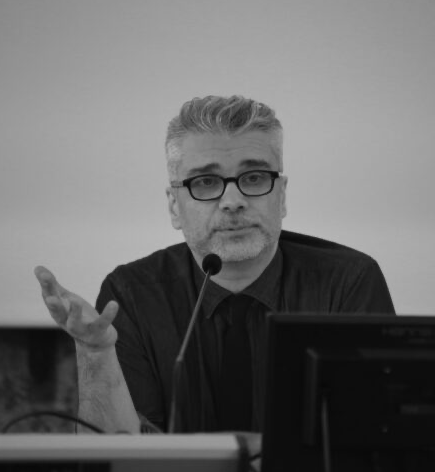“Redesign the future” is the title of the Designmonat Graz online symposium that is held by FH JOANNEUM and Creative Industries Styria in cooperation with the Green Tech Cluster. In three panels, international speakers present solutions and best practice examples for the major project of the future – its’ very own rescue. Design will take a significant role in it.
Technically, the future had already been planned. We knew the problems as well as their solutions. The implementation was next. And then everything changed in an instant. “Today is tomorrow’s yesterday” as we like to say. Back to Square One then. It’s all about rethinking and redesigning the future, today more than ever. And here we have the online symposium’s topic which approaches the future in different ways. This also calls for a philosophical and spiritual base/foundation, as described in Stuart Walker’s latest book “Design And Spirituality”. He will open the symposium with a keynote, followed by 3 panels dealing with the following topics: the future of design education, the complex topic of climate in public space and design that puts people center stage even more.
LiveStream:
You are currently viewing a placeholder content from Default. To access the actual content, click the button below. Please note that doing so will share data with third-party providers.
More Information
Chat:
You are currently viewing a placeholder content from Default. To access the actual content, click the button below. Please note that doing so will share data with third-party providers.
More Information
DAY 1
MONDAY 10, 2021,
15:00 CET
Program
15:00 CET: Opening and Welcoming by Eberhard Schrempf and Karl Stocker
_Keynote Stuart Walker: Design after a pandemic_
_Panel 1: The Future of Design Education
- Speaker 1: Luisa Bocchietto | independent professional architect and designer and Former president of World Design Organization
PANEL 1
THE FUTURE OF DESIGN EDUCATION
Moderation: Karl Stocker
hosted by FH JOANNEUM, Karl Stocker
Design has accompanied the development of humankind from the beginning and especially in the last 150 years was actively involved in the development of modern industrial society. This results in a great/high social responsibility for the future which reflects in the curricula of traditional universities as well as universities of applied sciences. “In design education worldwide, design is being described as an improvement of the status quo as well as an innovation” says Karl Stocker, symposium curator and Head of Department for Design and Communication at FH JOANNEUM. A contradiction to the common perception of design that merely aims for aesthetic styling. It is rather the question of a wholistic perspective which also takes ethical aspects into account. Therefore, a modern design education is also an investment into shaping the future. In their lectures, Kerstin Scheuch of CENTRO University in Mexico City, Lorenzo Imbesi of Sapienza University Rome and Luisa Bocchietto of Citta del Arte in Biella will speak on these topics.
_SPEAKER 1: LUISA BOCCHIETTO | WORLD DESIGN ORGANIZATION
Architect and designer, graduated from the Milan Polytechnic, she works with her own studio in Biella. She has carried out urban recovery, building renovation and urban planning projects, worked as an art director for companies in the furniture sector and as a visiting professor for many design schools. She has written architecture and design texts and held conferences in Italy and abroad. She participates in international juries and design promotion events around the world.

Luisa Bocchietto
Abstract
Title: Design from products to solutions
After the industrial revolution, a period following which design was born, we are today in another revolution, the digital one.The dematerialization process that this revolution has introduced also affects design, which no longer deals only with material products, but also with processes and services.
Today we use the same methodology developed in the last 100 years, to create aesthetic and functional products (form and function) produced industrially, to develop also more intangible processes and services for the community.If previously at the center of our interest there was man, with his needs, including in this the application of ergonomics, the development of attention for design for all, up to the satisfaction of his dreams, now we must change the paradigm and focus on respect for the planet. Man must take a step back and, humbly, start thinking not only about his own desires, but about the common good.
It is an urgent need that we have all become more aware of. The period of the pandemic we are experiencing has made us touch the imbalances that we have introduced with our thirst for conquest, production and consumption. We must combine the theme of aesthetics with that of ethics. There can be no more beauty without taking responsibility. There can be no more innovation without sustainability.
This does not mean stopping producing, growing and innovating, but we will have to know how to do it in a smarter way, reducing waste and optimizing non-renewable resources. Perhaps we will have to give up designing goods in favor of solutions and services that allow us to live better together. This paradigm shift opens up new scenarios that offer great research opportunities for young designers. They will be asked for a multidisciplinary approach, an ability to listen to the needs of larger groups of interlocutors and an ability to synthesize form, function and sustainability. I see sustainability as a third element that is inseparable from the first two, those aspects that we have already learned to manage over time; now they will have to integrate with this new criterion. I am thinking of sustainability not only as an environmental component, but also as an economic and social component. This is why we understand the path as a design growth that moves from the product to the entire production process, to ensure a conscious approach from the very beginning of the work. Design can influence production methods, reducing the consumption of materials and the production of waste, as well as being able to contribute to reducing pollution, social and gender imbalances, favoring accessibility to services and basic goods in the direction of supporting the achievement of 20/30 United Nations goals (UNsd Goals).
_SPEAKER 2: KERSTIN SCHEUCH | CENTRO MEXICO
Kerstin Scheuch is founding member of CENTRO and Director general since its opening in 2004. She is an expert in strategy, innovation and education, and is featured in the book:
Women of Design: Influence and Inspiration.
CENTRO, an institution for higher education in design, architecture, digital media and film in Mexico City.
www.3.centro.edu.mx

© José Jasso
Abstract
Title: Reflections on the future of education
In 2017 CENTRO organized an international conference on artificial intelligence and creativity with leading experts. I asked them about future priorities in higher education, and they coincided: data and ethics. What seemed visionary then, during the pandemic and recent crises across industries, politics and citizenship has become imminent: Higher education on all levels and independent of segment, subject matter or format has to be rebuilt on these two foundations.
In my participation I would like to highlight the paradigm shift in educational processes, structures, environments, technologies and particularly objectives, that has been taking place for more than two decades. I will argue that a desirable future within the context of systemic complexity, inequality and acceleration is only possible through the participation of all stakeholders and a creative and collaborative re-invention of the entire educational system.
_Speaker 3: Lorenzo Imbesi | Sapienza University Rome
Lorenzo Imbesi is an Architect, PhD and Full Professor at Sapienza University of Rome, where he is Director of SDR Sapienza Design Research Interdepartmental Centre and Chair of the Design Unit of the PhD Program.
He is a member of the Cumulus Association Executive Board, a member of the Executive Committee of EAD European Academy of Design, a member of the Board of SID Italian Society of Design, and he has been visiting Professor in many international Universities. Also, he is the author of many papers in journals and books.
www.uniroma1.it

Abstract
Titel: Design Education in the Post-Industrial Age
The historical epistemological shift from the fordist-taylorist paradigm of mass production into the post-industrial development draws a new economic and productive geography: as the industry of the chain assembly leaves space to new forms of labour and production along the so-called knowledge society and the rise of new technologies, design education focuses the new scenarios rising for the creative professions and the chances for the experimentation of new critical keys beside market.